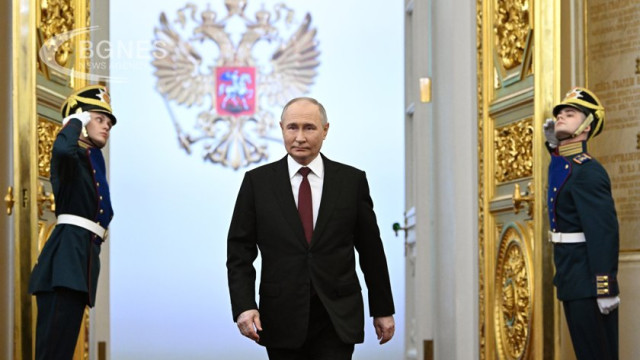Russian President Vladimir Putin was sworn in at a lavish ceremony in the Kremlin for a record fifth term.
In his speech, he said that governing Russia was a "sacred duty".
"Serving Russia is a great honor and responsibility," the 71-year-old politician stressed in the Kremlin's gilded St Andrew's Hall.
"We will go through this difficult period with dignity and become even stronger," Putin said, adding, "We are a united and great nation and together we will overcome all obstacles. We will implement everything we have planned and together we will win."

The ceremony began at 12:00 p.m. local time. It was attended by a host of politicians from the country's top leadership, but also celebrities from show business such as Steven Segal. Also came the leader of the extremist group and pro-Kremlin motorcycle club "Night Wolves" Alexander Zaldostanov.
The US and most EU countries boycotted the event and did not send diplomats.
Vladimir Putin won the election convincingly in March this year, weeks after his most prominent opponent Alexei Navalny died under mysterious circumstances in a penal colony. Western leaders described the election as unfair and undemocratic.
From the KGB to the Kremlin
Putin began working as an intelligence officer before launching a political career in the city hall of his native St. Petersburg in 1991, when the Soviet Union collapsed.
Boris Yeltsin, Russia's first president, appointed him head of the FSB security service in 1998 and prime minister the following year.
It ended with his appointment as acting president when Yeltsin resigned.
Putin won his first presidential election in March 2000 and a second term in 2004.
His rise initially raised hopes that Russia would reform and become a predictable, democratic partner of the West on the world stage.

Putin gained popularity by promising stability to a country still recovering from a decade of humiliation and economic chaos after the collapse of the Soviet Union.
After two terms as president, he returned to the post of prime minister in 2008 to circumvent the constitutional ban on more than two consecutive terms as head of state.
But Putin kept the reins of power firmly in his hands and returned to the presidency four years later. He also won a fourth term in 2018.
Russian opposition figure Yulia Navalny earlier today condemned Putin's policies.
In 2021, she will be elected to the presidency. Putin jailed his most vocal rival, Navalny. The crackdown on opposition movements has intensified since the start of hostilities in Ukraine. Thousands of Russians have been given prison sentences, and new legislation has been used for this purpose. The West imposed sanctions that effectively cut Russia off from the global banking system, which further emboldened the Russian leadership.
"Our country is led by a liar, a thief and a murderer. But this will definitely be put to an end," the widow of the late Alexei Navalny said today. Other political opponents are serving long prison sentences or have long since fled into exile.
The 71-year-old politician has been at the forefront of efforts to overthrow Western domination. His grip on power has tightened further in the past two years. Public dissent to the war has been effectively silenced through legal proceedings and imprisonment. The future of Putin's rule may be decided by the war in Ukraine, which has claimed thousands of lives and triggered unprecedented Western sanctions that have created major problems for the Russian economy. Yet in recent months Putin has demonstrated his enduring strength. Domestic opposition has been silenced, the economy is growing again, the Russian army has strengthened in eastern Ukraine, and the president has resumed his travels abroad. / BGNES







